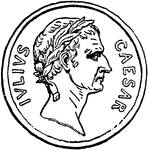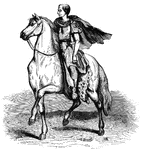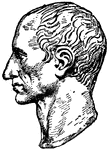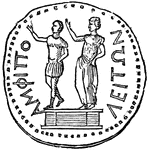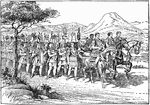Clipart tagged: ‘Julius Caesar’
!["After a successful summer campaign, [Caesar] made his way to the coast and cross over into Britain. He then withdrew into his winter-quarters in Gaul, but in the following year returned into the island, defeated the British Celts under their king Cassivellaunus, and reduced the country to a dependency, compelling the Britons to pay tribute and give hostages."](https://etc.usf.edu/clipart/78900/78943/78943_landing_01_mth.gif)
Landing of the Romans in Britain
"After a successful summer campaign, [Caesar] made his way to the coast and cross over into Britain.…
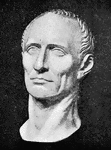
Caesar
"Julius Caesar was the leader of the popular party, who in a few years was destined to prove himself…
Caesar Crossing the Rubicon
Julius Caesar led his legion across the Rubicon river from Cisalpine Gaul to Italy. By doing so, he…
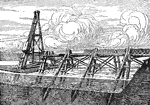
Caesar's Bridge Over the Rhine
A bridge built by Julius Caesar and his legionaries to aid in crossing the Rhine River. They are considered…
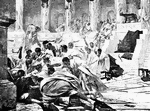
Caesar's Death
"The Death of Caesar. Naturaly such extraordinary success made him enemies, and though the city seemed…
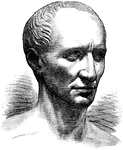
Julius Caesar
An image depicting Julius Caesar, a Roman general and statesman. He was a key component to the shift…
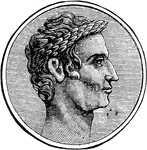
Julius Caesar (profile)
An illustration of Caesar. A politician of the populares tradition, he formed an unofficial triumvirate…
!["[Caesar] mustered the soldiers in the Campius Martius, and requested a statement of their grievances. Their demands appeared to have a reference to a payment of their dues, the bestowal of promised presents, and a release from further duty. Caesar well knew that the best way to humiliate an insurrection is to grant what it clamors for. He accordingly made an address to his old legion, being careful to begin with "Citizens," instead of "Soldiers." This was gall and wormwood. To be addressed as citizens by their beloved commander! "I discharge you." said he. "You have had enough of fatigue and wounds. I release you from your oath. As to your presents, you shall be paid to the last sesterce." The old veterans could stand no more. They burst into tears, and began to beg for forgiveness. With a certain prudent hesitation, Caesar received them back to favor; but he took care that the leaders who had fomented the mutiny should be executed."—Ridpath, 1885](https://etc.usf.edu/clipart/78900/78945/78945_citizens_01_mth.gif)
Citizens! I Discharge You.
"[Caesar] mustered the soldiers in the Campius Martius, and requested a statement of their grievances.…
Caesar Crossing the Rubicon
An image of Julius Caesar and his army crossing the Rubicon River, which is located in northeastern…
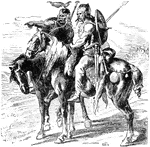
Gaulish Warriors
An image of two Gaulish warriors participating in a series of military campaigns against Julius Caesar.

